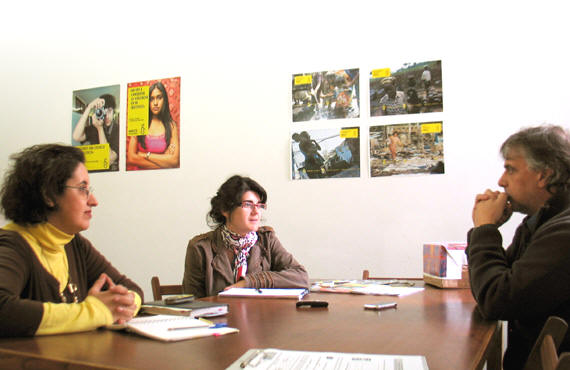Amnesty International and the IUF have
undertaken several joint actions and
efforts in the past: the campaign to
denounce Coca-Cola’s persecution of
trade unionists in Guatemala in the
1980s; the actions to denounce human
rights violations during Uruguay’s
military dictatorship, together with the
Justice and Human Rights Movement of
Porto Alegre and our dear friend and
fellow activist Jair Krischke; the
International Conference on Human Rights
and Against Electoral Fraud in the
Dominican Republic in 1994; and the
campaign against violence in Urabá,
Colombia, in 1996, among many other
initiatives. Amnesty International was
born almost 50 years ago with the aim of
fighting for the liberation of prisoners
of conscience. Now it is also demanding
dignity for the “prisoners of poverty,”
creating a space for reflection and
action, where it will join forces again
with the IUF to “be more and do more”
together.
Amnesty International
is taking its work one step further,
seeking to raise awareness on the abuses
that cause poverty and aggravate it, as
well as on the situations of poverty
that generate human rights violations.
“This demand for dignity poses a new
challenge to the
organization,” representatives of
Amnesty International
said at the launching of the new
campaign. “People who live in poverty
often have their political and civil
rights violated. The lack of food,
employment, potable water, land and
housing, combined with increasing
inequality and growing insecurity create
a global crisis that requires global
solutions based on international
cooperation to defend human rights and
the rule of law.”
To learn more about the “Demand
Dignity”
campaign,
Sirel spoke with
Ivahanna Larrosa,
executive director of
Amnesty International Uruguay,
and
Claudia Serrón,
who heads the organization’s Growth and
Development Department.
-How many years has AI been working in
Uruguay?
Ivahanna Larrosa
(IL) - Next year will mark the 25th
year in the country. The office opened
right after the reinstatement of
democracy in 1985. In the 1970s,
Amnesty International
worked extensively for Uruguay,
defending the cause of political
prisoners, but it didn’t have an office
here.
-With the
“Demand
Dignity”
campaign
Amnesty International
is going one step further…
IL
- That's right. Over the years,
Amnesty International
has expanded its area of work; more
specifically it has expanded to cover
rights integrally. It has always fought
against political and ideological
persecution, but with time it moved
beyond that. It’s in this sense that it
launched this global campaign for
dignity, which focuses on addressing
poverty as a core problem. For
Amnesty International
the key is to work from a human rights
perspective and build on that to fight
for the eradication of poverty.
-In Latin America there’s a lot of work
to be done in that area, as it’s the
region with the highest level of
inequality…
IL
- In Latin America this new
approach links our organization with
other social groups, with trade unions
and governments; it capitalizes on a
number of efforts that we’ve been
carrying out. And working in this
region, which has one of the highest
rates of inequality, is certainly a
challenge!
-When we speak of human rights here in
the South, the idea that I have is that
in our collective mind it is associated
with the human rights violations
committed by the de facto governments.
Do you get that same impression?
IL
- Yes. In fact, I think there’s a very
narrow view of what human rights are,
not just in our region, but also
globally. It’s not easy to make people
understand that human rights are so much
more than that, that they also include
civil and political rights, economic
rights, cultural rights, etc.
Another barrier that stands in the way
of defending human rights is the idea of
the violation of rights, because it
implies that if a right isn’t violated
there’s no need to defend it. Ideally we
should defend all rights all the time,
in the course of our daily lives, at
every level.
-Latin America has never been as
“democratic” as it is today, and never
before has it been so poor; and this
entails a complex and extremely
dangerous situation if we don’t perceive
democracy as an instrument for achieving
social welfare…
Claudia Serrón
(CS) - Which is why one of the
key goals of this campaign is to get
stakeholders to participate actively. In
all its recent campaigns
Amnesty International
has stressed this. We need to bring
people out of the vicious cycles of
poverty and exclusion. To do that we
need to increase awareness of what our
rights as citizens and workers are, and
based on that awareness, use whatever
tools we have available to demand
respect for our rights.
We must focus on the power each of us
has as an individual, because democracy
is important, it’s necessary, but it’s
not enough to guarantee every right.
-Do you have a lot young people coming
to Amnesty International for information
and to get involved?
IL
- Yes. Although they’re not
participating in the same way they did
in the past. They’re using the new
computer tools and technologies to get
involved. But
Amnesty International
still needs to look for ways to
incorporate people of all ages to its
efforts. That is the challenge we have
before us.
Our main goal is to make people more
aware of their rights so they can
protect them, and that means learning to
use the new media and technical tools
available today.
-Do you see the IUF as an ally in your
“Demand Dignity”
campaign?
IL
- Absolutely. The IUF is a very
important ally because it reaches a lot
of people, has the capacity to influence
organized workers and has a broad
experience in the labor movement.
This campaign gives us an excuse to
coordinate actions and leverage our
common causes. It is a way of
formalizing links that have united us
for a long time.
